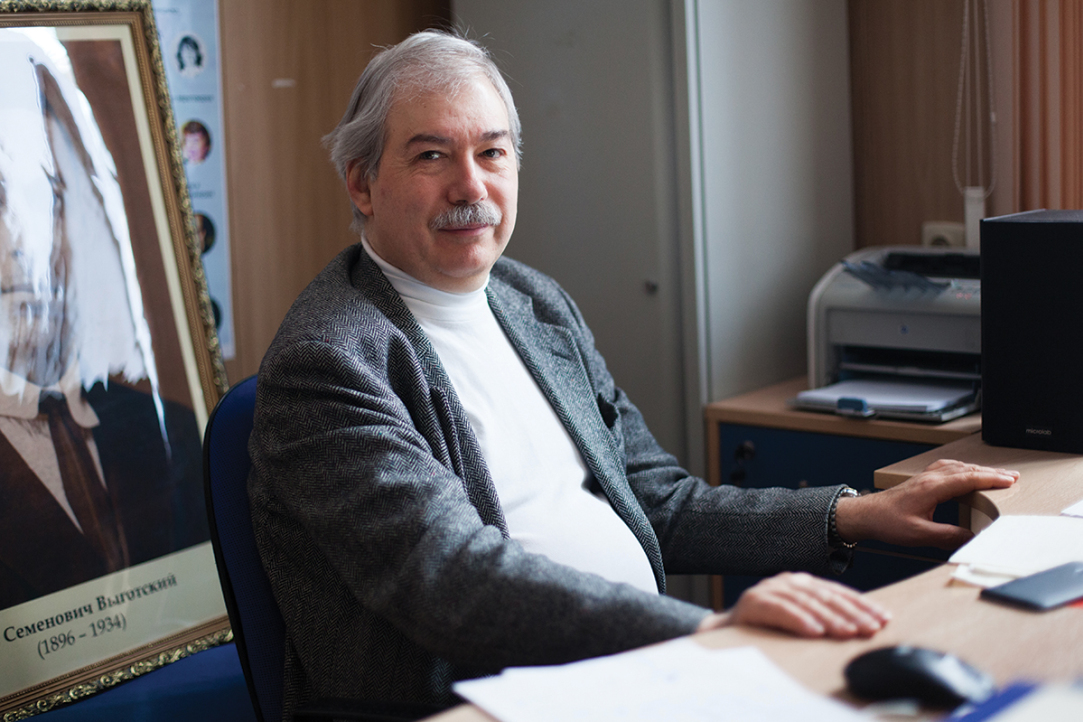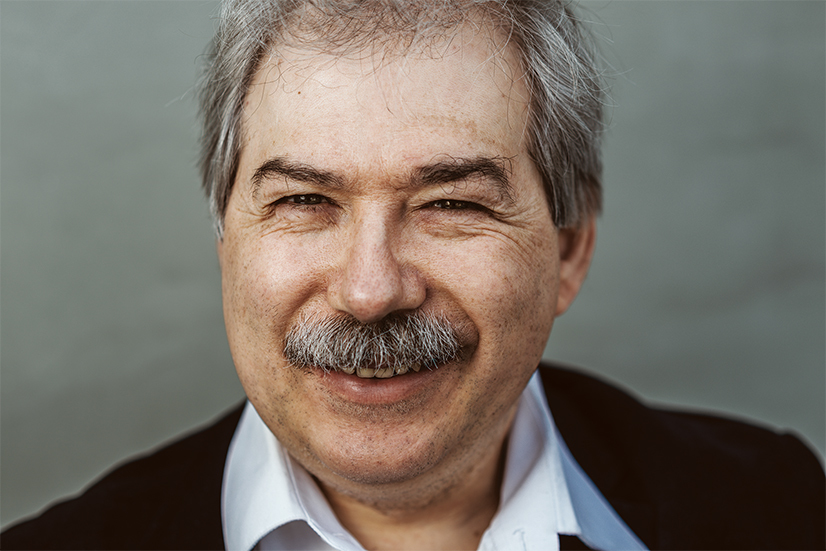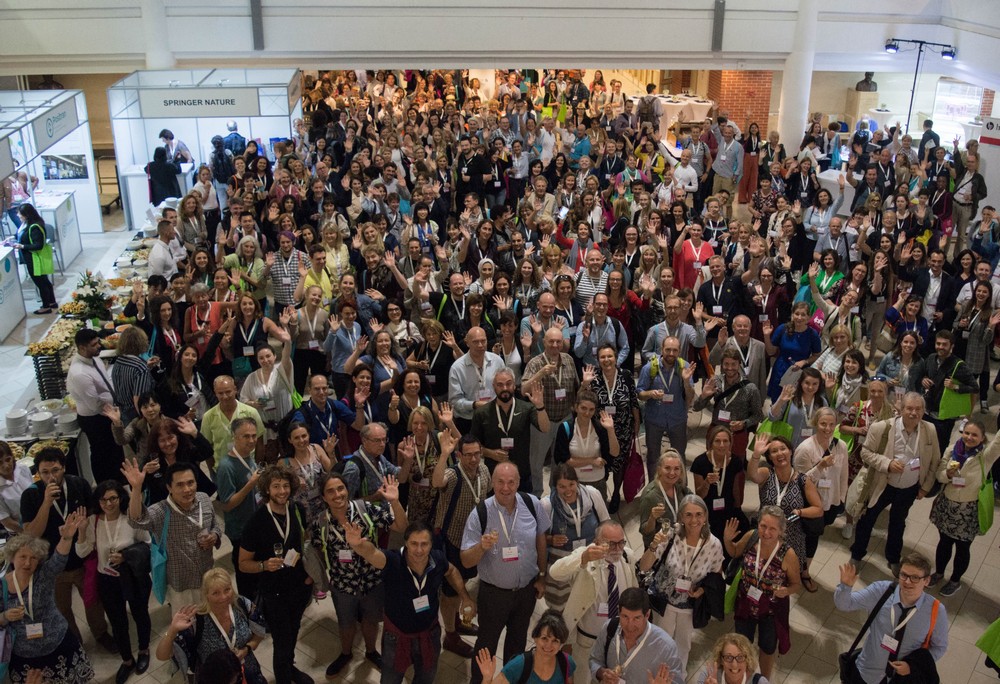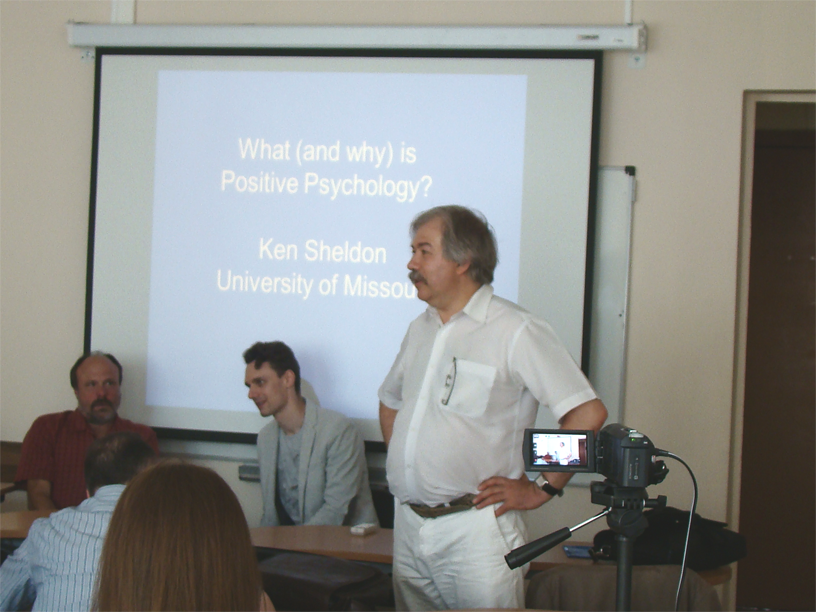‘People Make All the Difference’

How does one go about studying happiness, joy, and optimism? What makes life good? What qualities help people to cope with the negative effects of the pandemic? Dmitry Leontiev, Professor of the Faculty of Social Sciences and Head of the International Laboratory of Positive Psychology of Personality and Motivation, discusses these questions and more.
Professor Leontiev, tell us how and under what circumstances the International Laboratory of Positive Psychology of Personality and Motivation was created, and how its staff of leading researchers was formed.
Our laboratory was formed in several stages, and in the beginning it was a much simpler structure, far from international. It all started with the Faculty of Psychology at Moscow State University, where I worked for over 30 years. For a long time, there was a sense of reliable certainty there: it was impossible to find any posts or placements in the faculty for graduates of the faculty, even for the best of them. So in the 2000s, several of my very strong graduates went to work at HSE University. After a while, they came up with the idea of setting up a formal unit at the University and inviting me there. Where before we existed as a sort of ‘invisible college’, an invisible team not tied to any location, it was now possible to institutionalise our structure in the School of Psychology at HSE University. So, in 2011, our small research and teaching laboratory dedicated to positive psychology and quality of life was established, which I headed. We started to work actively on this issue and after a few years we decided to participate in the international laboratory competition. Since we have always had a good international network, it was not difficult for us to find a qualified person to be the scientific supervisor of the future laboratory. It was a little more difficult to persuade him, but we succeeded in that, too, and now he certainly does not regret working with us. I am talking about Professor Kennon Sheldon from the University of Missouri. As a result, in 2014 our small team transformed into the International Laboratory of Positive Psychology of Personality and Motivation. This, in turn, was the main justification for me to move to HSE University full-time.
What is positive psychology and what does its study entail?
Positive psychology is a branch of psychology that studies the conditions, prerequisites, and factors of a good life. But what does that mean — ‘a good life’? In the past, positive psychology mainly promoted itself through the idea that happiness is most understandable, readily visible, and sells well. Now it has expanded from the idea of the concept of happiness to other aspects of a positive and good life. And the impetus for this has been the very transformation of the concept of the good life, which is explained by changes in the historical context.
After World War II, the focus of positive psychology was mainly on disorders, dislocations, problems, and ways of solving and correcting them. Over time, life began to improve, and these themes began to be phased out. The focus was on a life worth living, a decent, quality life. The question of how to live when there is no struggle to survive came into focus. As a character in a famous Soviet comedy said, ‘it is good to live, and it is even better to live well'. Then it turned out that the usual patterns of how to survive and solve problems do not help to understand how to live well. Martin Seligman, the founder and leader of positive psychology, noted, ‘We know very well how to get from -7 to -2, but we do not know how to get from +1 to +4’. There was a need for some new research, a search for new patterns. Thus, a new subject area and agenda began to take shape, while the approaches used remained traditional for psychology.

The subject area of positive psychology today includes many different topics: above all, positive emotions — happiness, joy, optimism, satisfaction and involvement — and the meaning of positive interpersonal and working relationships; mitigation of and resistance to stress (what contemporary literature refers to as ‘resilience’). The idea of positive psychology is now that we should not so much solve problems once they arise, but rather nurture certain inner strengths in people such that these problems do not arise at all. In essence, we are moving from correcting problems and disorders to preventing them. This is particularly relevant in the Russian context, because the value of life in our culture has always been quite low. We do not value our own and other people's lives, hence the neglect of health and healthy lifestyles and safety rules. This leads to high rates of violent crime, accidents, and suicides. The well-known phrase ‘take care of yourself’ is far less common and natural in our country than in Western culture. We are not used to taking care of ourselves. That is why positive psychology is very relevant and meaningful, because it promotes the value of life, our own and of those around us.
Moving on to more specific topics, what areas of research are the Laboratory’s staff involved in?
To a certain extent, we are continuing the work we were doing before the creation of the Laboratory, while adding a new dimension to the study of positive psychology. A large part of our work is devoted to the problem of meaning. The problem of meaning in general has always received much more attention in our culture than the problem of emotion. More than a hundred years ago, at the turn of the twentieth century, during the Silver Age, many Russian philosophers criticised the idea of the primacy of happiness in people's lives, a principle earlier put forward by British utilitarian philosophers. As an alternative, the authors proposed the idea of meaning, so it became a key domestic principle, more important and adequate for the management of human behaviour. Echoes of these debates could be observed in the philosophy and psychology of the 20th century, when approaches to the study of the problem of meaning were actively developed. I myself have been dealing with this problem all my professional life and wrote my Candidate of Sciences and Doctoral dissertations precisely on the problem of meaning. The last decade has literally seen a boom in the problem of meaning, which has once again taken centre stage in global positive psychology. Leading publishers continue to publish studies and books on it in huge numbers, which would have been hard to imagine even 15-20 years ago. Indeed, it is a much more complex and multidimensional construct than positive emotions or happiness, because meaning cannot simply be reduced to a collection of emotions and experiences. And we have quite a rich body of work on this topic, based on the ideas of the culture and activity tradition of domestic psychology.
Another important idea for us is the concept of personal potential. By the way, back in 2011, before the laboratory became international, a large collective monograph entitled ‘Personality Potential. Structure and Diagnostics’ was published, almost all the authors of which subsequently became members of the already international laboratory. This theory explains what in ordinary language is called the inner core of personality. The key idea is that personality potential is the capacity for self-regulation, or the ability to respond flexibly to the challenges of the world around us, which come to us in the form of feedback from our own actions. We have been working with this rather complex construct for more than 10 years already, developing different aspects of the personal potential problem. These ideas have now moved into wider practice. For example, several years ago the Sberbank Charitable Foundation created a special programme for the development of personal potential based on our developments. They use it in secondary education in many regions to develop the personal potential of students. All these ideas are in line with another project that we have been implementing together with a number of other departments of HSE University since November last year. I am referring to the recently established Human Capital Multidisciplinary Research Center.
The problem of choice is another separate topic, albeit less common than the previous ones. Several members of the Laboratory have done serious research on the topic and defended dissertations on it. In 2015, four members of our staff published a monograph entitled ‘The Psychology of Choice’ — in fact, the first domestic book on the subject. So, we have competitive developments that we can offer at the highest international level in a whole range of research areas.
The Laboratory cooperates with both American and Russian universities. With what universities do you collaborate, and what joint projects have you been able to implement?
The University of Missouri is home to Kennon Sheldon, the academic supervisor of the Laboratory. This facilitates a number of studies that we conduct together, both international cross-cultural and Russian and American, including data collected by the University of Missouri. Another key American university for us, the University of Rochester, is the headquarters of a scientific field with which we are very closely connected — self-determination theory. This university has long been the home of its creators and authors, Richard Ryan and Edward Deci. The same tradition is represented by our laboratory's foreign colleagues, Kennon Sheldon and his colleague, lead researcher Martin Lynch, who is based at the University of Rochester. It is a very large and authoritative school, which attracts hundreds of people from all over the world for conferences every three years. The approach is in many ways close to our own, so we easily find common ground and overlapping themes with Kennon Sheldon, who was raised in a completely different tradition. Martin Lynch has even been to Russia several times, speaks excellent Russian, knows Russian psychology well, and is an important link between the Russian and American schools of psychology.

We also involve different regional research centres in our research and projects, so people interested in our approaches, theories, and methods are located in very different parts of Russia. Perhaps the strongest and most varied links we have are with Tomsk State University, a place I have worked with in various capacities for over 20 years. We hold seminars, schools, and other research and educational events. Some of them are organised independently by our colleagues who invite us, while others are handled by us and then held in Tomsk. These events are always of great interest and attract people from all over Siberia. We have also brought our American colleagues to some of the seminars, which is particularly memorable for the participants, as not many foreign scholars can travel that far. In 2018, colleagues from Tomsk University organised a very interesting school on quality of life in Altai, which they intend to hold again once the epidemiological situation has improved. We have also implemented interesting joint projects with Kamchatka State University and other research centres. What unites our foreign and domestic cooperation is people. Interpersonal relationships are always at the centre, surrounded by links between organisations. People make all the difference.
What have been some of the Laboratory's more interesting research findings over the years?
Together with our American colleagues, we have conducted interesting research on the relationship between freedom and responsibility. Using empirical data from both countries, we found that freedom and responsibility are closely linked. That is, we were able to find confirmation of this well-known philosophical idea on a psychological level and prove that the two phenomena are not contradictory at all. The results of this work were published in a leading journal.
We also conducted an interesting study on loneliness. Our methodology focuses on the relationship between different aspects of the experience of loneliness, both positive and negative. After all, loneliness brings together very complex experiences that go beyond the traditional approach to it as an exclusively negative symptom. There is a whole class of people who value and enjoy solitude very much, finding serious positivity in it. As a rule, these are people involved in intellectual work in one way or another, and it is for them that solitude represents a positive thing. To explore this topic, the Laboratory developed a unique questionnaire, which was later even translated into English and adapted in the United States – a situation very different from the more usual scenario, where we translate into Russian and adapt the methodologies of foreign colleagues. This is a methodology that we started working on with my colleague Evgeny Osin, even before the international laboratory emerged. Among the projects that have attracted particular interest at international conferences is a cross-cultural study on attitudes to loneliness, which considered the specifics of experiencing it, as well as motivations and emotions in such a situation, using the examples of three countries: Russia, the United States, and South Korea. We are now preparing these results for publication.

Last year, against the backdrop of the coronavirus epidemic, we did a great deal of research on pandemic consciousness and even managed to summarise our findings on the subject at a symposium organised at the world-class Human Capital Multidisciplinary Research Center. We reacted very quickly to the new phenomenon and suspended all our ongoing projects at the time in order to gather as much empirical material as possible. We are now in the process of analysing and summarising it, and preparing to publish the results. Some of these studies concerned personal characteristics that enable us to reduce the negative emotions, stresses, and experiences associated with the pandemic. Another fascinating study concerned treating the situation as a situation of uncertainty and, again, preventing the negative emotions associated with it. In addition, we analysed limitations and self-isolation as a forced mode of solitude. Another paper focused on the role of optimism and inner support. Positive psychology focuses primarily on internal buffers that enable us to survive and stay sane in this difficult situation and not to be negatively affected by it. These include relying on and taking responsibility for one's own decisions as opposed to expecting this to be delivered by the authorities or health services. We have found out that people who take responsibility for decision-making are more resilient to the psychological effects of the pandemic. Related to this is optimism, not unthinking but responsible optimism. Responsible optimism helps to remove negative emotions, while unthinking optimism, paradoxically, is not helpful.
Is the Laboratory working towards a certain goal? What tasks do you see as priorities for the coming years?
Last year we had an important event: we launched the Master's Programme ‘Positive Psychology’, which was designed by Laboratory staff. Applicants showed great interest in it, and the competition for places was very rigorous. And this comes as no surprise, since our Master's programme is the only one in Russia run by people who are directly involved in the production of knowledge in this field. Moreover, our colleagues are acquainted with virtually all of the leading scientists in the field of positive psychology and actively involve them in delivering lectures and seminars for students. This is what is known as first-hand knowledge. Our main task now is to get a foothold in this new field, which we have already successfully entered. In addition, new books are being prepared, new dissertations on loneliness, uncertainty, and personal change are being defended. But still, our efforts are now more focused on endurance and maintaining stability. We would like not only to get through the current situation of uncertainty of the pandemic without losses, but also to learn something useful from it.
Dmitry Leontiev
Head, International Laboratory of Positive Psychology of Personality and Motivation
See also:
‘The Mind is Not a Mystical Entity That We Can Only Discuss in Theoretical Terms’
Melanie Sheldon, an instructor at the University of Missouri – Columbia, recently offered a lecture course at the HSE Winter School 2015 on the psychology of motivation, which was organized by the International Laboratory of Positive Psychology of Personality and Motivation, headed by Dmitry Leontiev. She also offered an open lecture on 'Sex and Evolutionary Psychology' at HSE. Melanie recently spoke with the HSE news service about her experience taking part in the HSE Winter School.
‘Pay Attention to Reality’
On the eve of the new year we spoke to the head of the International Laboratory of Positive Psychology of Personality and Motivation, Dmitry Leontiev about why positive psychology does not solve problems but keeps them at bay, is uncertainty dangerous and why shouldn’t we battle with anxiety about the future.


